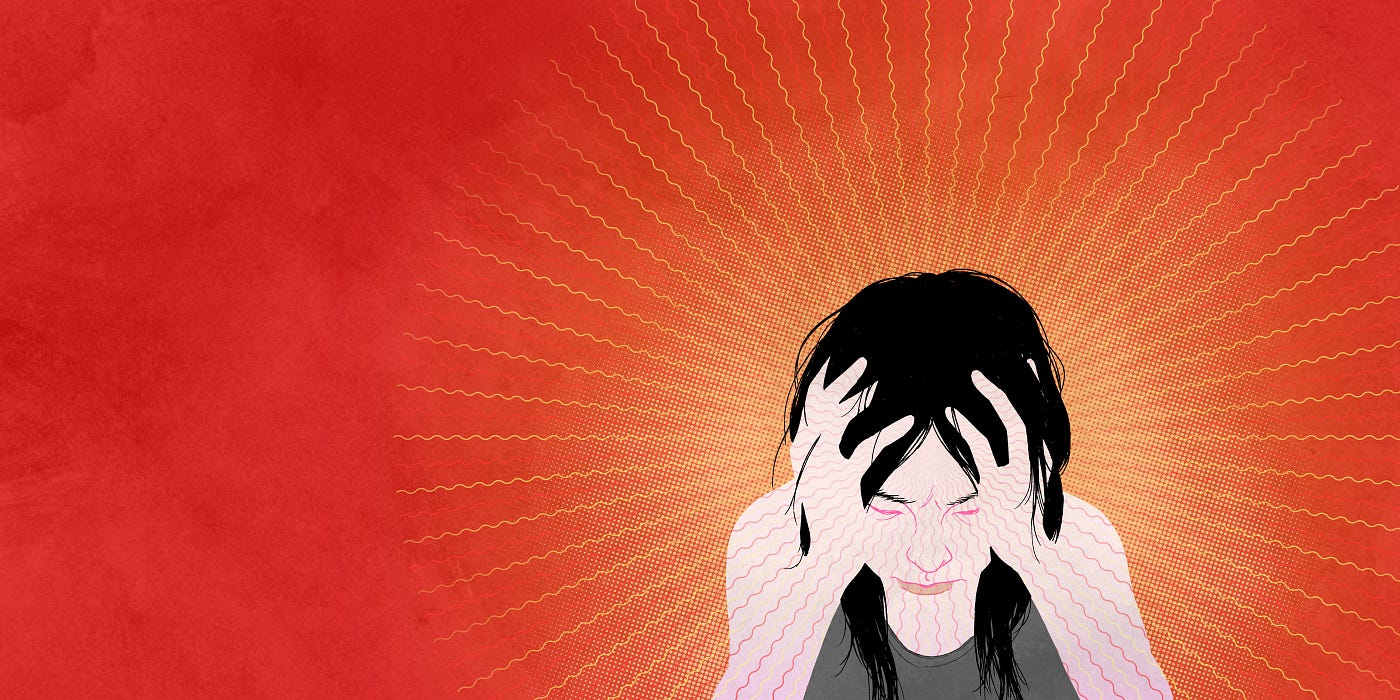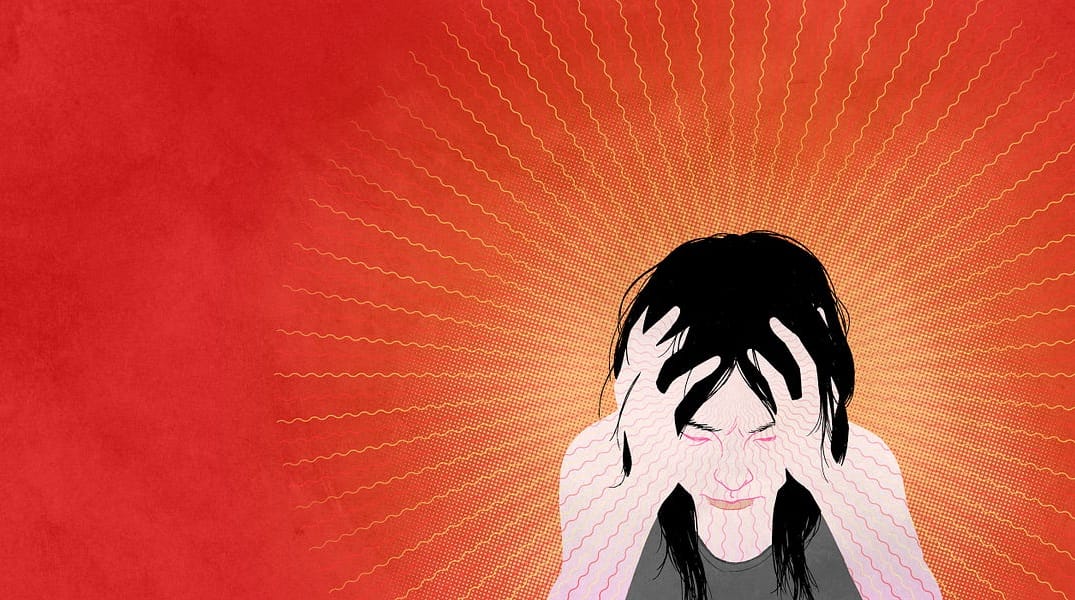
By Angela Rodriguez Prilliman
Imagine a large, oddly shaped box with an unevenly distributed weight. You can carry it on your side with the help of your hip for a while, but eventually it gets uncomfortable. So you switch it to the other side, hold it over your shoulder for a bit, then put it on your head and drag it on the floor, trying out every position possible. It’s super-annoying, but you can carry it around with you if you have to.
That’s what living with constant anxiety feels like, especially when you’re in an office setting where you have ongoing tasks to complete, meetings to hold and people whose job it is to ensure that you’re hitting quarterly goals and owning your projects.
Imagine a large, oddly shaped box with an unevenly distributed weight. You can carry it on your side with the help of your hip for a while, but eventually it gets uncomfortable.
I’ve been on various medications to help me function as a “normal” human being since my freshman year of college. Lexapro made me numb to the world; Strattera made me constantly nauseous; and Effexor killed my sex drive (which wasn’t exactly ideal for a newlywed). By the time I tried Wellbutrin, I was just hoping it would wake up my lady parts while still keeping my anxiety at bay. After a month, I started to feel more anxious than usual, and I became convinced that it wasn’t working.
So without asking my doctor, I just stopped taking my meds. I optimistically, and stupidly thought, “I don’t need these. I’m smart. Experienced. A top performer at work. I can manage this. I don’t need help.”
Two weeks later, as the medication’s effects increasingly dwindled, a wave of panic, exhaustion, racing thoughts and sleepless nights overtook me.
At work, I physically couldn’t sit at my desk for more than two minutes at a time. My normal multitasking capabilities had completely disappeared. The tasks, projects and deadlines in front of me raced through my head at a million miles an hour, too fast for me to even sort through them. I felt dizzy. I became tense and increasingly edgy and would snap at my coworkers. I would notice my shortness, adjust myself and try to carry myself more mindfully during my next meeting. Later, I would stare at my list of tasks, feel the weight getting uncomfortable again and go for a walk.
The anxiety kept building despite my various attempts to calm myself. I paced back and forth from the kitchen to my desk, to the bathroom, to a conference room, back to my desk, then up again for a talk to my coworker, hoping that discussing pointless things would help. The weight kept getting heavier as I walked back to the bathroom, trying to keep the tears from coming and taking a few deep breaths. Finally, I escaped to the second floor bathroom and, with my head in my hands, silently cried.
My normal multitasking capabilities had completely disappeared. The tasks, projects and deadlines in front of me raced through my head at a million miles an hour, too fast for me to even sort through them. I felt dizzy.
An anxiety attack this powerful doesn’t exactly make for a glamorous LinkedIn headshot.
Human psychology is a weird thing. The issue is not whether you have a mental disorder; it’s where you lie on a spectrum. Or so my shrink tells me. Anxiety, ADHD, bipolar: I have different levels of all these disorders. And trying to explain what specifically I’m struggling with and how it affects my job is complicated. I try to prevent potential distractions as much as possible. I make lists, calendar everything and keep my belongings in specific places since I tend to forget things easily. I bought a discrete pill case so that I don’t look like Cheri Oteri’s Collette Reardon when digging through my purse for my medication.
None of these things makes it seem like I’m doing anything different from anyone else, but that’s because I am back on medication. The drug cocktails I take do the bulk of the work to stabilize the highs and lows, allowing me to focus and complete more cumbersome tasks, and they also prevent the anxiety attacks.
I’m sure I’m not the only person in the office who has the occasional meltdown in the bathroom, but I often wonder who else is hiding with me without my knowing it. The meritocratic workplace only allows for the occasional conversation about anxiety (the only “socially acceptable” mental disorder to have), and discussions about the issue are usually just humble brags about how important and busy someone is and not really about dealing with ongoing mental health issues.
You can’t casually say, “Man, I’m just really hypomanic this week” or “ADHD is just kicking my ass today—I’m forgetting almost everything.” No one wants to be a Debbie Downer and get demoted. Those comfy enough to talk about their various disorders, including me, usually keep it at a surface level. We minimize and talk about it from a mostly conquered place. No one wants to be that guy/girl who has conversations prefaced with “Oh, it’s because I have [insert mental disorder here].” And you would never, ever mention these kinds of mental health struggles to superiors or influencers at work.
The meritocratic workplace only allows for the occasional conversation about anxiety (the only “socially acceptable” mental disorder to have), and discussions about the issue are usually just humble brags about how important and busy someone is and not really about dealing with ongoing mental health issues.
However, some things fell through the cracks during my month-long medication hiatus. I grew increasingly anxious about my work performance and convinced myself that I was letting everyone in the company down. Maybe I was being dramatic, but the sickly feeling in my stomach was telling me that I was on the verge of getting fired. I was sure my superiors thought my performance was declining in general, instead of it being a temporary issue.
A week later, I impulsively asked my boss if I could talk to him. In typical ADHD fashion, the idea of coming clean to him about my anxieties came to me in a moment. I immediately fixated on it and quickly decided this was the best and only plan for action to prevent him from firing me. Yes, explaining your mental health issues to your boss without it affecting their respect for and perception of you is probably something you should think through. But I was feeling classic impulsiveness.
“I have anxiety,” I explained. “Well, anxiety-related issues I’m working through. I just wanted to let you know because you’ve probably noticed that I’ve dropped the ball. More specifically, I’ve forgotten a couple of things I was supposed to do these past few weeks, but I’m in between different medications, and I’m working on it. So this is only temporary, but I’m letting you know because I know evaluations are coming up.”
I don’t remember much else of what I said; I just know it probably didn’t make a ton of sense and was hard to understand since I was talking at a million miles an hour. Luckily, I have a great boss who is understanding and supportive, and who hasn’t changed how he works with me or removed me from important projects. I know not everyone is as fortunate.
No one wants to be a Debbie Downer and get demoted. Those comfy enough to talk about their various disorders, including me, usually keep it at a surface level.
Not much changed at work after I spilled the beans to my boss, which is a good thing. I feel a little better now that I’m not hiding what’s going on with me, but I still notice that people flinch when they hear words like “bipolar” and “OCD,” so I carefully navigate professional conversations, hoping to mask any signs of weakness or incompetence. Mostly, I just make light of my disorders like they aren’t a big deal. Which is half-true. They’re more of a midsize deal, but I try not to let them define how I see my career self or rule out what opportunities I can and can’t take. Thankfully, more and more well-known people — Lena Dunham, for instance — have come forward to talk openly about mental illness, helping to remove the idea that people like me can’t have a successful and stable career.
I really wish I could tell you that I’ve found the best medication balance; worked through and cured my anxiety, ADHD and mild bipolar disorders; and now live a completely balanced, stable professional life.
But in the process of writing just that one paragraph, I have gotten up three times. Once to go to the bathroom, then another to grab a Q-tip to clean my ears, then another to grab some Häagen-Dazs out of the fridge. On top of that, I’ve changed the Spotify playlist I was listening to twice, and I watched three TED talks. OK, maybe it was five TED talks. Some of them were related to mental disorders, so technically they were research for this essay.
Yep, I still don’t have it all together. But I will say that through a lot of self-introspection, and with my doctors and support groups, I’ve come to realize that while I may have rough patches throughout my professional career, it’s OK. As comedian Joshua Walters said, “Being diagnosed with a mental illness doesn’t mean you’re crazy. Maybe it just means you’re more sensitive to what most people can’t see or feel. Maybe no one is really crazy, but everyone is just a little bit mad. How much depends on where you are on the spectrum. How much depends on how lucky you are.”







